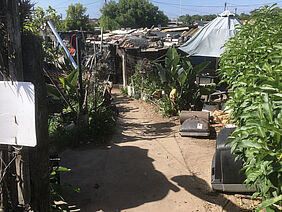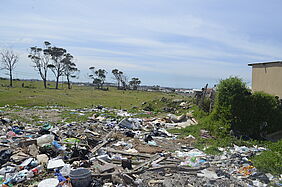Two big eyes are staring at me. „Do you want to get up here?“ I ask. I am still standing on the truck. Five minutes before, we have unloaded the newly built push cart for Khusta. I have stayed on top to take some photographs when I recognized the boy trying to climb up the truck. He keeps looking at me, a bit wary at first. But then he smiles and grabs my hand to get pulled up. The others follow, on their own or with a little bit of help for the smallest. Laughter and joy fills the air when the boys and girls conquer the truck.
It is the evening of the 10th of October. We are in Walmer Township, in the informal part to be exact. This means people are building and extending their houses the way they feel like. Like Khustas neighbour because of whom the path to Khustas house is not wider than 1.10 meters. It also means that there is no running water in the house. People fetch their water at a tap down the road.
The kids are starting to laugh: a rooster has decided to land on the roof of the truck cabin. Against the light I can only see a black silhouette. Cables are cutting the sky around it like an abstract graphic drawn with a marker. Each cable connects one shack to the city’s power grid. Six cables on one pole mean that six homes are supplied with electricity.
For most of the people in the informal area of Walmer, home is a self-built shack made out of metal sheets, wood and plastic. Their properties are not mapped like the properties in the formal part where everything is carefully documented, where every house stays in between the borders and where roads or driveways are not narrowed due to randomly extended shacks.
I jump off the truck. A plastic bottle cracks under my shoes, one of the many surrounding the truck. One of the many covering Walmer. Rubbish is a, if not the problem. Nearly every free space is used as a dumping site. Whole properties are covered with a layer of plastic, paper and tin. Trash is piling up in corners, street gutters and open fields.
The kids watch me turning around, trying not to step on broken glass. I look back at them. If I should take a picture of them, I want to know. The bright smiles and the immediate group arrangement made every answer needless. I think I never captured so much pride and joy in just one photograph. Maybe I could have reached a similar level if I would have taken a picture of Selina.
Selina is an elderly women living in one of the most remarkable houses of Walmer. It is one of the oldest heritage buildings and Selina made it not just a home but a little piece of paradise. When you enter her garden you feel like entering a whole new world. A place like this can only exist because Walmer Township has never been relocated. Though it was planned to do so during apartheid it never happened due to the resistance of the people living there and the support of the white population in the neighboring suburb.
I realize two big eyes staring at me. Again. A broad smile and a self-confident gesture follow. I lift the camera and release the shutter. The camera clicks. The boy waves from the top of the truck and demands: „Show me!“
Selinas garden, her pride presenting it to us, the joy of the kids climbing up and around the truck, the excitement about the pictures, … It all adds up to something memorable. Something, we will remember every time we walk or drive through the township. Something we will keep in mind when we plan the design for February. Something, we will definitely never forget.


